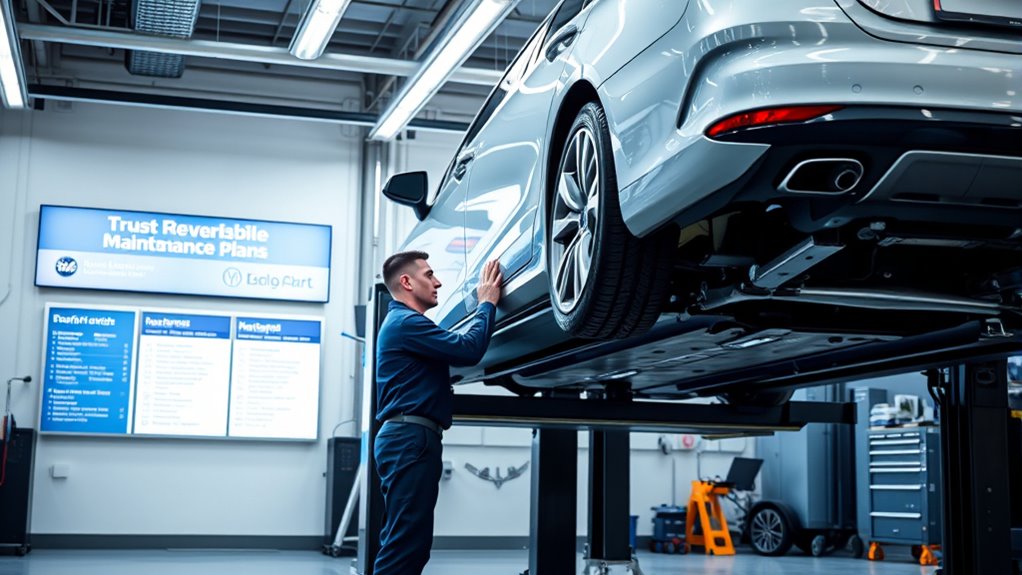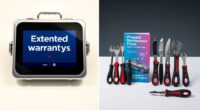Whether dealership maintenance plans are worth it depends on how often and how well you maintain your vehicle. They offer convenience and can help prevent costly repairs by keeping up with scheduled services, but they might be more expensive than paying for individual services if you don’t use them often. Consider your driving habits, vehicle age, and needs before committing. To discover if one fits your lifestyle and budget, you’ll find helpful details ahead.
Key Takeaways
- They offer scheduled, hassle-free maintenance, reducing the risk of neglect and costly repairs.
- Cost-effectiveness depends on vehicle usage; plans may be more expensive if services aren’t needed regularly.
- Coverage often excludes certain repairs, potentially leading to extra costs outside the plan.
- Plans suit long-term owners who value convenience and predictable expenses.
- Comparing plan costs with pay-per-service options helps determine if they provide good value.

Are you wondering if a dealership maintenance plan is worth it? It’s a common question, especially with so many options available for vehicle upkeep. To decide, you need to consider the cost comparison between these plans and paying for services individually. Dealership maintenance plans often come with a fixed price, which can seem appealing since you’ll know exactly what you’ll spend upfront. However, it’s important to weigh whether these plans actually save you money over time. Sometimes, the cost of the plan might be higher than what you’d pay if you scheduled services as needed, especially if your vehicle doesn’t require frequent maintenance. On the flip side, if you tend to forget or delay maintenance, a plan can help you stay on schedule, potentially avoiding costly repairs caused by neglect.
Another key factor to consider is coverage limitations. Dealership maintenance plans typically include specific services like oil changes, tire rotations, and inspections, but they often exclude or restrict certain repairs or parts. For example, you might find that tasks like brake work or replacing filters aren’t covered, or they come with additional charges. These limitations can add up, making the plan less cost-effective if you need services outside the covered scope. It’s vital to read the fine print carefully to understand which services are included and which are not. If your vehicle has a history of needing certain repairs or if you plan to keep it for many years, these coverage restrictions could influence whether the plan is truly beneficial for you. Additionally, understanding maintenance scheduling can help in planning and optimizing your vehicle’s care.
Ultimately, whether a dealership maintenance plan is worth it depends on your driving habits, vehicle condition, and how well you understand the plan’s coverage. Conducting a thorough cost comparison and clarifying coverage limitations will help you make an informed choice. If you drive frequently and want the convenience of scheduled care, a plan might be a good investment. Conversely, if you prefer to handle maintenance on your own or have an older vehicle, paying-as-you-go could be more economical. Weighing these factors carefully will help you decide if a dealership maintenance plan aligns with your needs and budget.
Frequently Asked Questions
Can Maintenance Plans Be Transferred to New Owners?
When considering transfer policies, maintenance plans can often be moved to new owners, but it varies by dealership. You should check with your dealer about the specific ownership transfer policies, as some plans include free or paid transfer options. Typically, transferring the plan requires notifying the dealership and completing some paperwork. Confirming these details beforehand ensures a smooth ownership transfer, maximizing the plan’s value for both you and the new owner.
Are Maintenance Plans Customizable to My Driving Habits?
Think of a maintenance plan as a tailored suit; it should fit your driving style perfectly. You can usually customize these plans with personalization options, allowing adjustments based on your driving pattern. If you drive mostly highway or city, talk to your dealer about modifications. This guarantees your plan aligns with your habits, saving you money and time while keeping your vehicle in top shape.
What Happens if I Sell My Vehicle Before the Plan Expires?
If you sell your vehicle before the plan expires, you can usually arrange an ownership transfer of the remaining maintenance coverage. This allows the new owner to benefit from the plan. If not, you might be able to cancel the plan and get a partial refund. Always check your dealership’s specific policies on ownership transfer and plan cancellation to make certain you understand your options and avoid losing any prepaid benefits.
Do Maintenance Plans Cover Repairs Caused by Accidents?
When you ask about accident coverage and repair exclusions, you’re curious if your plan shields you from accident-related repairs. Generally, maintenance plans focus on routine services like oil changes and tire rotations, not repairs caused by accidents. They typically exclude accident coverage, meaning damages from collisions or crashes aren’t covered. So, if an accident damages your vehicle, you’ll need separate coverage or pay out-of-pocket, as repair exclusions apply to accident-related issues.
Are There Any Hidden Fees or Costs Associated With Maintenance Plans?
You might worry about hidden charges or additional fees with maintenance plans, but reputable dealership plans usually clarify costs upfront. Be sure to read the fine print to spot any concealed charges that could pop up later. Some plans may have extra fees for services outside the basic coverage, so ask questions before signing. Knowing what’s included helps you avoid surprises and ensures the plan truly fits your needs.
Conclusion
Deciding on a dealership maintenance plan depends on your diligence and desire for peace of mind. If you prioritize peace, preemptive protection, and predictable payments, these plans can be worthwhile. However, if you’re a DIY devotee or dollar-conscious driver, they might not be the best bet. Ultimately, weigh your wants with your wallet’s wisdom. Remember, whether you choose to trust or tackle, thoughtful planning keeps your vehicle running smoothly and your worries at bay.









